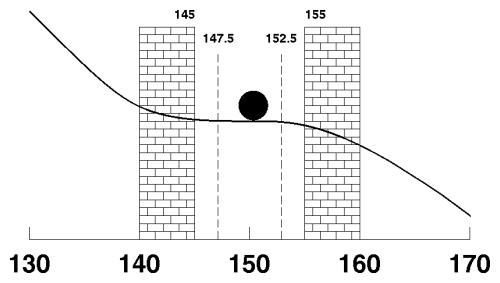

How can you guarantee you'll never regain the weight you lost?
Suppose your weight goal is 150 pounds and your appetite feedback
curve is the disastrous one shown above. If you rely on
your appetite alone, every time you eat too little you'll get an
unmistakable signal to eat more, but overeating raises no warning.
Overeating actually tends to make you eat more, since once your weight
begins to creep upward you'll get depressed and seek solace in food.
When you end your diet at 150 pounds, you're treacherously balanced on
the flat part of the curve there. As long as you stay close to 150
all will be well. You're like the backwards-wired thermostat on page
![]() which didn't cause a problem as long
as the temperature stayed close to 70 degrees. Eating too little is
no problem; smooth negative feedback tells you to eat more. But
inevitably, sooner or later, you'll eat a little too much: over the
holidays, at a party, or when you can't gauge portion sizes
accurately. Then, as your weight begins to creep upward, the malign
influence of positive feedback takes command, and weight gain begets
additional overeating in a process that literally feeds upon itself.
which didn't cause a problem as long
as the temperature stayed close to 70 degrees. Eating too little is
no problem; smooth negative feedback tells you to eat more. But
inevitably, sooner or later, you'll eat a little too much: over the
holidays, at a party, or when you can't gauge portion sizes
accurately. Then, as your weight begins to creep upward, the malign
influence of positive feedback takes command, and weight gain begets
additional overeating in a process that literally feeds upon itself.
The initial overeating that set off the destructive feedback loop was probably an isolated incident, not a permanent change in diet. It may even have been inadvertent, the result of additional calories added to a regular meal or reduced physical activity unaccompanied by lower calorie intake. The correction needed to restore balance is usually small and easy to make. But if the slow creep upward isn't spotted and arrested in time, before long you've gained 10 or 15 pounds and you're in a real mess. Losing that much weight requires a serious diet and the very thought of going back on a diet, particularly so soon after the last one, is hard to entertain. The temptation to abandon weight control is tremendous once things have gotten this far out of hand; you're well on your way to giving back all the gains of your diet.
The problem, clearly, is lack of feedback. You need continual guidance to achieve an accurate calorie balance week after week, month after month, year after year. And we know just how to do that! The very same trend calculation and charts that tracked the calorie deficit during your diet can now guarantee stable weight forever. All you need to do is adjust your meals not for a calorie deficit, but to balance the calories you eat with the calories you burn.
To control your weight you set limits to the fluctuation of the trend
and plan specific actions whenever the trend line impinges on a limit.
As when dieting you only consider the trend; daily weight is used
solely to calculate it. The band is a 5 pound region centred
around your goal weight; this encompasses the normal week to week
variation. There's no need to be obsessed with a perfectly constant
trend line; a couple of pounds more or less aren't really noticeable
and in any case are swamped by day to day changes in weight. If your
weight goal is 150 pounds, the band ranges from 147.5 to 152.5, shown
as dashed lines on the chart. As long as the trend is within this
range, there's no reason to change what you're eating. Eat whatever
you like, consistent with the calorie burn rate you determined at the
end of your diet (see page ![]() ).
).
By John Walker